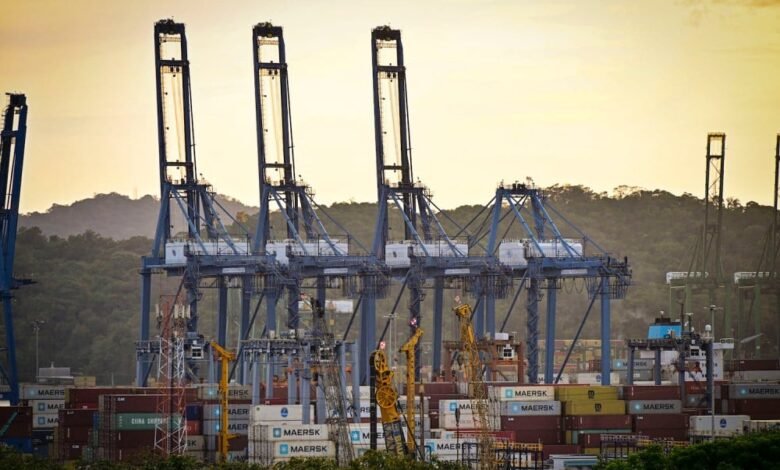Trump’s Panama Canal Deal Is a Win for China

China’s growing influence over key infrastructure in Latin America and the Caribbean has put the Trump administration on edge. Never have the White House’s concerns been more acute than with regard to the Panama Canal, where Hong Kong-based CK Hutchison operates two ports. US President Donald Trump has inaccurately described the company’s activity as equivalent to China “running the Panama Canal” and vowed that his administration would “take it back.”
Under pressure from Washington, CK Hutchison announced in March that it had agreed to sell its 80% ownership stake in 43 ports outside China and Hong Kong – including the two in Panama – to a consortium led by US-based investment firm BlackRock. The move appeared to be an early win for Trump’s aggressive deal-making diplomacy.
But Beijing had other plans. Within weeks of the announcement, China launched a regulatory and public relations campaign against CK Hutchison, forcing the private company to back away from the planned sale. China’s expanded antitrust laws give the government the power to block mergers or acquisitions that might affect competition in the country’s market. CK Hutchison is legally independent but has become highly vulnerable to Chinese authorities, especially as they have tightened their grip on Hong Kong.
After months of uncertainty, China indicated it would only approve the deal if state-owned shipping giant COSCO was added to the consortium and given a 20% to 30% stake plus veto rights in any arrangement. This request led to the talks being frozen.
Now, policymakers in Washington are said to be considering a worrying alternative: a version of the deal that would leave the Panama Canal ports in the hands of BlackRock and its Western partners — but allow COSCO to take a stake in the other 41 terminals, five of which are in Latin America and the Caribbean.
On paper, the settlement would allow the United States to claim victory in the Panama Canal. In practice, it would expand Beijing’s influence into a much larger network of ports — some of which carry greater economic and security risks to the United States than those adjacent to the strategic waterway. The deal that Trump may market as a political victory may be a poisoned chalice.
China’s investments abroad It includes almost all sectors, from mining to energy to telecommunications. But maritime infrastructure – including ports – played a particularly important role.
Through a combination of ownership stakes, long-term leases, and construction projects, Chinese private companies and state-owned enterprises are involved in more than 100 ports worldwide. In recent years, that footprint has increasingly extended into waters close to the United States, raising questions about the risks these ports may pose to American interests.
Armed with government funding, high-quality and affordable technologies, and political support, Chinese companies often act abroad as an extension of Beijing’s power.
Encouraged by Beijing, these companies are investing in economies starved for capital and infrastructure, providing countries with opportunities and connections while also drawing them into China’s orbit.
In some cases, such as in Djibouti or Cambodia, the deals have paved the way for the People’s Liberation Army to establish an overt operational foothold. However, more often than not, relationships remain centered around business or technology partnerships.
The close links that many Chinese state-owned companies, such as COSCO, maintain with central authorities – including the country’s military and intelligence services – allow them to act as Beijing’s eyes and ears abroad. Their financial heft and minimal transparency can create leverage and leverage over host countries’ policies, especially in those places where corruption is endemic and institutions are weak. Its ability to provide low-cost technology solutions locks countries into China’s technology pile, creating long-term dependencies and opening potential back doors for cyber hacking and intelligence gathering.
Beijing can also co-opt or coerce ostensibly privately owned companies when its interests are at stake, as in C. K. Hutchison’s experience. But its authority over state-owned enterprises is more direct.
As China Economic relations As Latin America and the Caribbean expanded, so did its presence in the region’s maritime infrastructure. In a study we published at the Center for Strategic and International Studies in June, where we work together, we analyzed 37 port projects across the region owned, managed, built or financed by Chinese companies.
Using 11 unique indicators, we assessed the relative level of risk each project poses to the economic and national security of the United States and its partners. These indicators included factors such as the exposure of the US economy to port disruptions, proximity to major maritime choke points, and the presence of Chinese technologies such as cargo scanners and smart cranes that can be used for surveillance purposes.
Despite dominating the headlines, the two Panamanian ports targeted by Trump – Balboa and Cristobal – do not top the list in terms of risks. Other ports in the region, including Kingston in Jamaica and Manzanillo and Veracruz in Mexico, have docked above Panamanian facilities due to a combination of factors such as their proximity to the United States and their exposure to Chinese operational influence or disruption.
It is worth noting that many of the high-profile ports were operated by CK Hutchison, although projects associated with Chinese state-owned enterprises rather than private companies were subject to harsher penalties in the registration methodology.
Aside from Balboa and Cristobal, CK Hutchison operates five additional ports throughout Latin America and the Caribbean: the second and third ranked ports of Manzanillo and Veracruz as well as two other ports in Mexico and one in the Bahamas. The only port in the top three that lacked Hutchison’s presence was Kingston, where the state-owned Chinese merchant port exercises significant influence.
These are some of the busiest container ports in the region, each serving billions of dollars in cargo arriving on North American shores each year. Many of them also regularly host US Navy ships, which rely on trading stations in the area to refuel and resupply. As the United States has intensified its military operations in the Caribbean in recent months – including deadly strikes on alleged drug smuggling boats – it has invited American warships to dock at or near Hutchison-operated facilities such as Manzanillo and Balboa, highlighting their growing strategic value.
CK Hutchison first began acquiring facilities in Latin America and the Caribbean in the 1990s. However, Beijing has reduced the company’s independence in recent years. China’s 2017 National Intelligence law requires even private companies to hand over sensitive data and other valuable information to authorities if requested to do so. Beijing’s tightening control over Hong Kong, especially after its imposition of the 2020 national security law, has blurred the lines that once insulated the city’s private businesses from state pressure.
Beijing displayed its authority over CK Hutchison earlier this year, when it moved to thwart a massive $23 billion deal between the company and the BlackRock-led consortium. China’s powerful State Administration for Market Regulation quickly launched an antitrust review of the deal for “protection.” [China’s] national sovereignty, security and development interests,” according to China’s Foreign Ministry, issuing rare public warnings against any attempts by CK Hutchison to circumvent the review.
Chinese authorities have even targeted the expansive business empire of CK Hutchison’s founder, 97-year-old Hong Kong billionaire Li Ka-shing, and ordered state-owned enterprises to halt any new deals with companies linked to the Li family. Meanwhile, state media criticized CK Hutchison with nationalistic rhetoric, accusing the company of “selling out.”[ing] From all the Chinese people.”
This intense pressure campaign delayed negotiations beyond their July deadline, closing the door on the possibility of a quick and painless agreement. Giving up its indirect stake in these strategically valuable facilities has proven unacceptable to Beijing.
On July 28, C. K. Hutchison It announced that it would seek to bring a Chinese investor into the ports deal in order to obtain Chinese regulatory approval. Reports quickly identified that company as COSCO. The state-owned giant is among the world’s largest shipping and logistics companies, operating an extensive network of dozens of port terminals globally, including the recently opened mega port of Chancay in Peru. Cosco is seeking a 20% to 30% stake, along with veto power, in any deal.
Allowing COSCO to join the deal may be the only way forward, given China’s influence over the approval process. Several formulations are said to be under consideration, including the aforementioned proposal that would see COSCO excluded from politically sensitive Panamanian ports while giving it a stake in 41 other CK Hutchison facilities around the world. This outcome may be politically attractive to the Trump administration, because it may claim victory in the canal.
But Trump’s focus on ports in Panama risks putting the United States in a worse strategic position than it was before the deal.
While CK Hutchison has clearly demonstrated that it is vulnerable to pressure from Beijing, it remains a private company driven primarily by commercial interests. By contrast, COSCO is directly supervised by the Chinese central government, meaning its operations are primarily driven by China’s national interests. On January 7, under the Biden administration, the US Department of Defense blacklisted COSCO as a “Chinese military company” due to its close ties to the People’s Liberation Army.
Replacing CK Hutchison’s overseas holdings with a consortium that includes COSCO as a major stakeholder is unlikely to reduce risks for the United States and its partners. On the contrary: Even if COSCO is excluded from Panama’s ports, it would make new inroads into other regional ports, such as Manzanillo and Veracruz, where our study found that US economic and security interests are most at risk. Allowing a Chinese state-owned company to take a stake in Mexican port operations would also risk a breakdown in U.S.-Mexico economic security cooperation.
Negotiations on the port deal will set an important precedent for how the United States will manage China’s expanding role in regional infrastructure. Panama, for its part, is seeking to establish itself as a strong partner to the United States by filing a lawsuit against CK Hutchison to terminate its contracts at the two canal ports, meaning China could lose its stake in the isthmus regardless of how the deal goes.
Allowing China to link negotiations over the Panama Canal to COSCO’s efforts to deepen its global footprint would be a tantalizing gift from the United States. Any decision to bar COSCO from Panama, while allowing it to enter dozens of other facilities in the Western Hemisphere and beyond, would sacrifice long-term strategic interests of the United States for immediate political gain.
The challenge for Washington is to look beyond Panama to assess how various port deals impact regional trade and security. Only then can the Trump administration begin to move from bombastic rhetoric to a lasting regional strategy.
Don’t miss more hot News like this! Click here to discover the latest in Politics news!
2025-10-17 10:00:00




